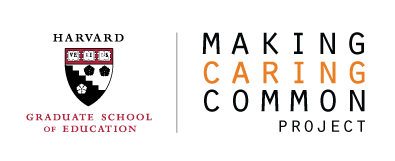How can you encourage honesty in kids? Watch the video and review our tips for parents.
Read MoreSort by topic
- Bias
- Caring Families Research Project
- College Admissions
- Current Events
- Diligence
- Empathy
- Equity
- Family Resources
- Gender
- Gender Bias
- Gratitude
- K-12
- Mental Health
- Moral and Ethical Development
- Parenting
- Raising Caring Kids
- Romantic Relationships
- Sexual Harassment and Misogyny
- Social-Emotional Learning
Empathy is at the heart of what it means to be human. It’s a foundation for acting ethically, for good relationships of many kinds, for loving well, and for professional success. And it’s key to preventing bullying and many other forms of cruelty. The following are five guideposts from Harvard’s Making Caring Common can help parents cultivate empathy in children.
Read MoreParents and caretakers want to ensure that their children are safe, respected, and able to learn when they are at school. But many parents and caretakers feel that they don’t know what happens inside school walls. When parents and school leaders talk together about what the school is doing to create a safe and caring community, everyone can learn and engage in positive change efforts. You can set up a time to ask these questions of the principal, assistant principal, or guidance counselor. You can send a letter with some or all of the questions. You can also share them with the parent representatives on your school’s parent council. You can suggest that parents and school staff work together to pick a few questions that are most important for your school community and meet on a regular basis to work on them.
Read MoreThe following is a partial list of resources for parents interested in preventing misogyny and sexual harassment.
These resources offer useful activities, information, websites, programs, and curricula. While we think each of the identified resources contains valuable information, we do not endorse all the recommendations or views in these resources. Some of the resource descriptions listed below have been pulled from organizational websites.
Read MoreBased on our research and the wisdom of practitioners, and based in part on recommendations from the Girl Scout Research Institute, we have created the following easy to-use guide to help parents identify high quality girls’ leaderships programs.
Read MoreThese websites complement our report Leaning Out and offer useful programs, research, resources, and/or activities to promote girls’ and women’s equity and empowerment.
Read MoreWe all carry biases that are based on gender; throughout our lives we receive daily messages about what is expected of different genders. These biases become ingrained and it’s often impossible to completely get rid of them. But, if we can be more aware of our biases, we have a better chance of counteracting them. Use these tips and suggestions for understanding and addressing bias with your kids.
Read MoreDiscussing gender can be challenging. For some youth, this is an immensely personal or even heated topic that brings up questions of equality and privilege. Others may question whether gender biases even exist. Finally, the idea that biases can be implicit—and discrimination unconscious—may itself be a novel, challenging concept to some teenagers. Fortunately, the payoff in broaching these topics is huge. By allowing children to explore this topic, share ideas for improvement, and participate in community-building and empathy-promoting activities, you are taking steps towards ensuring that your home is a place where everyone is respected, supported, and empowered.
Read MoreAs a parent, you have a vital role to play in ensuring that the college admissions process reinforces important values and motivates your children to undertake activities that will allow them and others to thrive as adults. The discussion guide below is intended to help parents and their children ensure that the college admissions process is meaningful and constructive.
Read MoreThe college admissions process is a major rite of passage and a formative experience in which students receive powerful messages from adults—including parents, guidance counselors and admissions officers—about what these adults and society value. As a parent, you have a vital role to play in ensuring that this process reinforces important values and motivates your children to undertake meaningful activities that will better enable them to contribute to others and thrive as an adult. The college admissions process can also be a wonderful opportunity to get to know your children in a deeper way—to understand their hopes, worries, values, dreams—and what will help them thrive in college. Below are concrete steps that we as parents can take to make the college admissions process meaningful and constructive for our children.
Read MoreHow can we as parents prepare our teens and young adults to develop healthy, caring romantic relationships? Read our tips.
Read MoreGiven the prevalence of sexually degrading and harassing behavior in young people’s lives, these conversations are critical, but it’s vital that parents go beyond platitudes like “be respectful.” Following are six tips for parents for engaging in meaningful, constructive conversations.
Read MoreEmerging research suggests that family routines support children’s social and emotional growth, the building blocks for strong "empathy muscles." Recently researchers evaluating more than 8,500 children found that kids in families that sing, tell stories, read, play, and eat dinner together are substantially more likely to have high social-emotional health.
If routines build empathy, then intentionally big-hearted routines prepare kids for a lifetime of generosity. Doing Good Together™ – a national nonprofit empowering families to raise caring kids – has compiled a few tips to add more compassion to your family routines.
Read More













